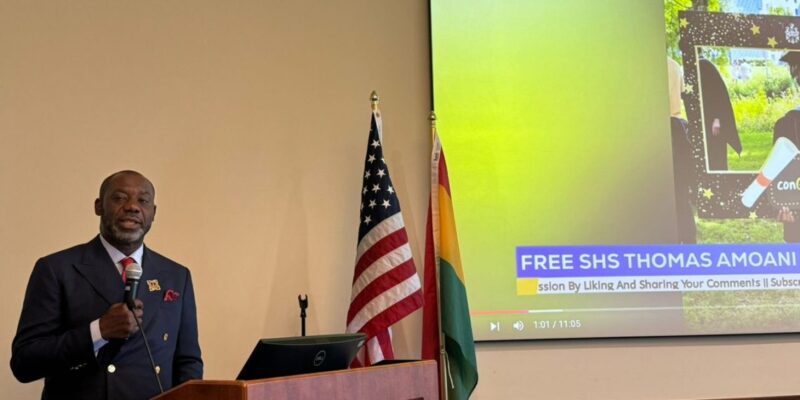The New Patriotic Party's (NPP) running mate, Dr Matthew Opoku Prempeh, has highlighted the significant achievements of Ghana’s Free Senior High School (SHS) policy, stressing its positive impact on educational outcomes and equity.
Speaking at the University of Memphis on Saturday, October 19, Dr Prempeh, widely known as NAPO, affirmed that the Free SHS programme has expanded access to education, particularly for disadvantaged students, while refuting claims that it has compromised the quality of education.
As the former Minister of Education during the policy’s implementation in 2017, NAPO emphasized that the initiative has strengthened academic performance and helped reduce educational inequality nationwide.
He noted that the programme has allowed more students to pursue secondary education without the financial obstacles that once hindered many Ghanaian families.
Dr Prempeh also highlighted the long-term benefits of the Free SHS policy, describing it as a vital investment in Ghana’s future.
He underscored that the programme is shaping a more educated and skilled workforce, which is essential for driving national development and improving the country's global competitiveness.
In addressing criticisms, NAPO reiterated that the Free SHS initiative has maintained educational standards and continues to foster greater opportunities for all students, regardless of their financial background.
“It is important to state that a cursory analysis of core subject performance from 2015 to 2023 points to a significant improvement in the past 5 years. For the 2022- and 2023-year groups, for example, more than 60% of candidates obtained A1-C6 in all core subjects, which are the qualification grades required for admission into a tertiary institution in Ghana."
“In fact, the 2023 results in this context are the best in 9 years. This, clearly, further refutes the argument by some naysayers that the Free Senior High School Policy was to compromise quality education."
“The equity component of the Free SHS programme has been crucial. Beyond removing financial barriers, we actively ensured that children from disadvantaged backgrounds could access our top schools. This led to the introduction of the 30% equity policy, reserving 30% of spaces in top schools for children from public basic schools, who often come from deprived backgrounds but had performed well in their final junior high school exams the BECE considering their backgrounds and other challenges within their study environment," he stated.
Latest Stories
-
The idea is to give everyone a chance in football – CAF rep on African Schools Football Championship
16 minutes -
MP Jerry Ahmed Shaib sounds alarm over prolonged ‘dumsor’ in Weija‑Gbawe, demands urgent action
25 minutes -
Women and Girls Bleed Too: Shining the Light on haemophilia and bleeding disorders in Women and girls
41 minutes -
‘Our galamsey fight is nothing but staged drama until the kingpins are dealt with’ – Prof Boadi
60 minutes -
Ramadan Cup: Kudus, Kamaldeen donate trophy, medals and cash prize for 10th edition
1 hour -
Gov’t must act to end banditry and domestic terrorism in Bawku – Mamprugu Overlord
1 hour -
A/R Minister announces plans to relocate Kumasi Central Prisons to help decongest the city
1 hour -
Your jobs are safe – Lands Minister assures Damang Mines workers
3 hours -
UNICEF and REMAPSEN host World Health Day webinar
3 hours -
Kumasi ready to buzz with Luv FM Family Party in the Park
3 hours -
Catholic Bishop of Goaso Diocese solicits stakeholder collaboration to ensure peace
3 hours -
9 devastating student deaths that sent shockwaves across the country
3 hours -
Heal Komfo Anokye Project advances to second phase
4 hours -
No more direct refund for 1st-year university students under “No-Fee Stress” policy – Apaak
4 hours -
Kaakie was talented but didn’t have time for music – JMJ
4 hours

